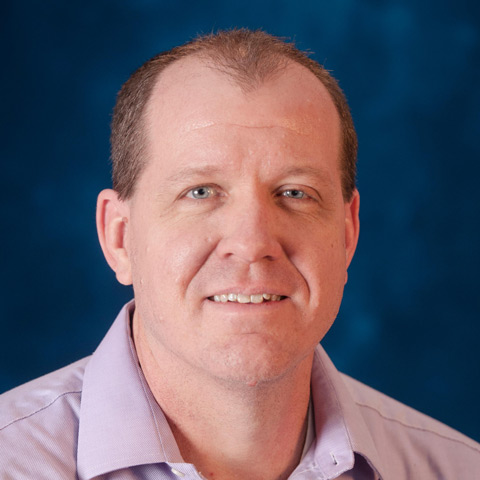
High Velocity Low Amplitude (HLVA) Thrust Manipulation
The practice of rapidly moving a joint beyond its physiologic or normal operating range of motion but below its anatomical or maximum limit, particularly for low back, mid-back, and neck pain.
Climb higher.
Regis’ Residency in Orthopaedic Physical Therapy provides maximum flexibility for working clinicians. Fast-track your professional development and gain recognition as an OCS with no need to relocate. This one-year program includes online classes, two one-week long intensives held on our campus in Colorado and 150 hours of direct mentorship.
Integrating the best current research with the dynamic experience of being surrounded with like-minded professionals with a greater purpose, Regis University’s Residency in Orthopaedic Physical Therapy allows for rapid post-professional development, advanced clinical decision making, and prepares candidates to sit for the American Board of Physical Therapy Specialties (ABPTS) Orthopaedic Clinical Specialist (OCS) exam.
Residents learn manual therapy techniques such as high velocity low amplitude (HLVA) thrust manipulation and dry needling, as well as joint mobilization, neurodynamic mobilization, muscle energy, soft tissues techniques and exercise prescription.

Andrew Honker, Assistant Director, Non-Traditional Admissions
Program Format
Online classes with two on-campus lab intensives
Credits for Completion
12 credit hours
Important Dates
Starts in January

The practice of rapidly moving a joint beyond its physiologic or normal operating range of motion but below its anatomical or maximum limit, particularly for low back, mid-back, and neck pain.

Manipulation of the nervous system in relationship to the musculoskeletal system, activating a range of mechanical and physiological responses in nervous tissues.

Hands-on techniques on muscles, ligaments and fascia in order to break adhesions and optimize muscle function, as well as exercise prescriptions for building and maintaining strength and range of motion.
Our orthopaedic residency approach is designed to find the very best PT in each participant. Theoretically this is a blending of many schools of thought in orthopaedic practice. More than a patient based test re-test approach, we identify what both the therapist and the patient can each provide to develop the best care for the individual. We seek excellence in hands-on orthopaedic care, excellence in treatment delivery and excellence in ongoing learning in the treatment process. We seek the Magis, to strive to do more and be the best we can be for others; we seek Cura Personalis to provide optimal care to the whole person to best serve the patient and society.
Our approach is mirrored in the past and the present in the works of leaders in orthopaedic practice. Where the best in practice is found, the roots of the Regis approach is found. Where the development and growth of orthopaedic practice is found, the ongoing genesis of our approach is rooted.
Students in this program complete 150 hours of mentoring during this program.Residents-in-Training (RiT) will be guided in independent study in their primary employment/mentoring site. Clinical mentoring will occur within the OCS and FAAOMPT community of affiliates to the Regis School of PT and the OMPT mentoring. Reflective professional development will include the use of outcomes tracking for clinical practice benchmarked against national standards.
Residents obtain mentorship through agreement with OCS, as part of their employment if employed at a site in partnership with the ROPT program, or with graduates/current Fellows-in-Training of the Regis Residency in OMPT, which represents over 150 board-certified specialists for mentorship throughout the U.S.
This program is offered as a hybrid model of learning, providing maximum flexibility for working clinicians. During this one-year program, classes are held online and are organized in a series of five courses, totaling 12 credit hours delivered over three semesters. Two one-week long intensives, held on our campus in Denver, compliment the online courses.
Additionally, students are required to complete 150 hours of mentoring either at their place of employment, or a clinical partnership site.
Regis University Residency in Orthopaedic Physical Therapy is accredited by the American Board of Physical Therapy Residency and Fellowship Education as a post-professional Residency program for physical therapists in Orthopaedics.

The Regis University Residency in Orthopaedic Physical Therapy is not accredited by the Commission on Accreditation in Physical Therapy Education (CAPTE) which accredits entry level physical therapist education.
All application materials for the OMPT Residency program should be submitted through the Residency and Fellowship Physical Therapy Centralized Application Service (RF-PTCAS), including:
Eligibility
Tuition and Fees
Tuition for the 2025-2026 academic year: $1,018 per credit hour
Total program credits: 12
Tuition is one part of the overall cost of attendance, which includes all expenses students may have, including basic living costs. For more information about tuition, fees and your estimated cost of attendance, visit our Cost of Attendance for Adult Undergraduates and Graduate Students page. Tuition and fees are subject to change.
Additional estimated costs beyond tuition include the following: RF-PTCAS application fee, background check, APTA and AOPT membership fees, cost of travel and lodging to Denver for the two 1-week-long intensives and the Leadership Development Inventory fee of $25. Technology fees are paid once during the program. For more information about the costs associated with residency and fellowship education, see the American Board of Physical Therapy Residency and Fellowship Education's (ABPTRFE) Financial Fact Sheet
This program is not eligible for Federal Aid, which includes state aid.
If you have questions about the program or want additional information, email ruadmissions@regis.edu or call 303.458.4900.
Graduates (2020-25) ABPTS board certification examination results in Orthopaedics:
We teach both manual therapy techniques such as high-velocity low amplitude (HLVA) thrust manipulation and dry needling as a part of our residency courses. These techniques are in addition to joint mobilization, neurodynamic mobilization, muscle energy, soft tissues techniques, and exercise prescription taught within the program. For many years, Regis University's Division of Physical Therapy has been a leader in manual therapy techniques. In addition, the program will include dry needing to reflect the most recent developments in this emerging area of orthopaedic physical therapy interventions. From an advocacy perspective, the Regis residency program is very active in supporting the rights (and obligations) of Physical Therapists to include all available tools within the knowledge and training to support the health of society.
Students receive 27 hours of training in dry needling. This may or may not meet the requirements of your individual state for utilizing this intervention as a part of your physical therapy practice. Please consult your state practice act for requirements as these vary significantly. All residents in training will need to comply with their state practice act prior to utilizing this technique in their clinical practice. Alternative skills will be emphasized for residents who have practice act restrictions to dry needling in their state of clinical practice.
Residents complete a minimum of 1,350 hours of clinical practice focused on orthopaedic physical therapy during the program. This includes virtual rounds, 300 hours of didactic education, and 150 hours of direct one-on-one clinical practice working with one or more mentors.
Residents in Training (RiT) are responsible for finding mentors, however, our faculty will assist as much as possible. Residents in the RUROPT will have access to graduates and current fellowship students. This represents over 145 Fellowship graduates, with over 200 potential mentors from our Graduates and current Fellows-in-Training as a combined group for potential mentorship throughout the United States. These highly training and motivated clinicians will be an excellent lead source for mentor time and additional learning in the program. Additionally student in the program may have access to other qualified PT mentors in their place of employment who agree to mentor for some or all of the 150 hours.
Mentors do not need to be established prior to starting the residency program.We will accept individuals without a set mentor as long as they are aware and committed to obtaining mentoring through developing a mentor relationship as soon as possible within the program. As the Residency is a defined one year process, obtaining a mentor/s within the first three months of the Residency is very important.
Mentors are required to be physical therapists who are either OCS certified, graduates of an orthopaedic residency or fellowship, or have significant and current experience (more than three years) in orthopaedic focused practice. Any U.S. licensed PT in good standing that is qualified is potentially eligible to mentor a resident in our program. We will need to establish a contractual relationship with new mentors, but this is typically a relatively simple process.
No. You can apply before you have formally set up an employment agreement. Students need to demonstrate that they are in full time (32 or more hours per week) of employment in orthopaedic clinical practice. This is important to ensure that each resident will have adequate patient exposure to complete the required indirect mentored clinical practice.
It is important to note when discussing the residency with an employer that there will be time-off needed to complete the 2 1-week long intensives on our campus in Denver, Colorado. Additionally time off may also be needed to complete the 150 1:1 mentoring hour requirement. If your mentor is in your place of employment you may not need to take as much time off. However, if not, be sure that you discuss this aspect of the program. 150 hours of mentor time over the course of a year is equivalent to four weeks of work time, and this is in addition to the 2 1-week intensives.
Once the student is admitted to the program Regis will work with the employer to set up a site agreement. We anticipate that we will have a select number of sites that reach out to us and we will help match those employers with a residency student when appropriate.
Licensure is required by the start of the program, however students (new graduates) that are not licensed at the time of application can be admitted conditionally. Students that start in the residency must have a valid physical therapy licensure in the United States and be licensed in the state of practice. The license must not be under suspension, revocation or probationary status.
Residency involves mentorship, peer interaction, collaboration, and exposure to areas of advanced practice that you would not get just studying for the OCS exam on your own (or with a prep course). Our Residency program is unique as you will get a higher level of interaction with our OMPT fellows during the program in a variety of ways. Our faculty are all fellows of our OMPT program. We will have many fellows across the country that will serve as mentors for the 150 hours needed for Residency 1:1 mentoring time. In addition, our fellows will interact in courses, online virtual rounds, and 2 week ground-based time at Regis. We will have a number of modules that will certainly give you the content needed for OCS level clinical decision making but more importantly there will be many opportunities to advance your practice in other ways beyond just the didactic/knowledge component of practice.
We develop thought leaders, researchers, innovators, advocates and builders of the profession. We do not isolate our ideas, we share and promote them for all to use. Looking to the structure of the residency, the hybrid model allows for a distance approach along with the two week long intensives on campus. Dry Needle training up to a level I completion will be in place. The opportunity to integrate learning into live patient care, standardized outcomes assessment, a diverse and high quality faculty and quite a bit more is available.
The majority of our residents are full-time or at least 80% time employed clinicians. One advantage of our residency program is that it can be completed by the full-time clinician without the need to cut back on hours or relocate. All of our courses utilize a hybrid online learning environment which means that you can work on your course work anytime of the day, and any day of the week. There are two week intensives in the fall and spring that require attendance on campus at Regis University in Denver, Colorado. One additional trip to campus is required for the final practicum examination. The amount of time required per week depends on the courses you are enrolled in at the time. Residents should typically plan on approximately 20 hours per week however, time varies depending upon your learning style.
No. Students in the residency are employed independent of Regis University and the residency program. Students in our program are responsible for finding their own employment and/or mentors. The employment/contractual relationship of the clinic/employee will be based upon each resident’s individual situation. This distance model intentionally allows flexibility for both new graduates, or established physical therapists to enter into residency training.
The location of the resident’s employment will be dependent on the resident but may be any of the following circumstances:
Our residency students will need to address/negotiate the time away needed from work in order to complete the program. Depending on your mentor situation this may include the full 150 hours of 1:1 time needed throughout the one-year program. It will also include the two 1-week long labs held on our campus in Fall and Spring.
The Residency in Orthopaedic Physical Therapy Academic Certificate is offered by the School of Rehabilitative and Health Sciences within the Rueckert-Hartman College for Health Professions.